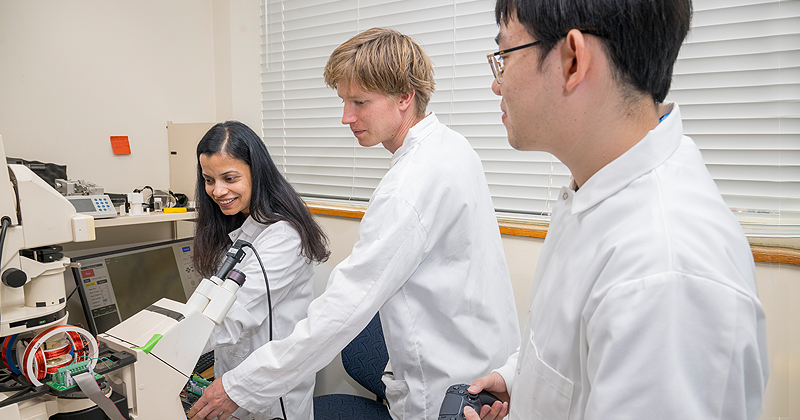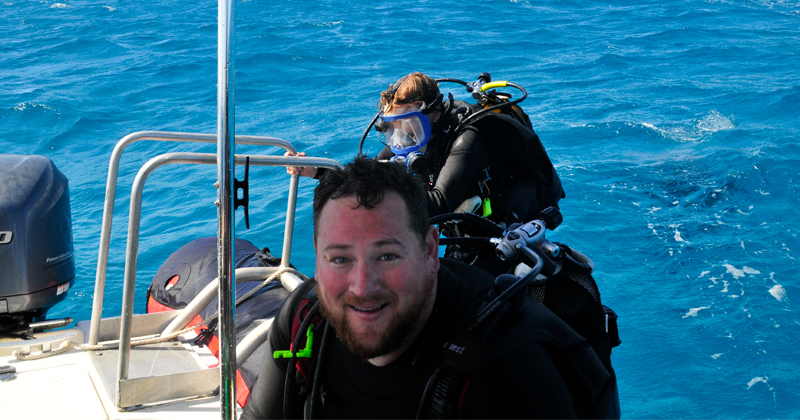


UD’s postdocs: Quiet, but crucial
Photos by Kathy F. Atkinson and courtesy of Colin Colbourn February 01, 2024
Low-profile, high-impact scholar-workers keep the research machine running
For 15 years now, Sudipta Mallick has been diligently attending college lectures, tirelessly devouring college textbooks and proudly earning college degrees. Even now, at age 35, she’s still scurrying across campus, imagining the future in the University of Delaware’s ceaselessly humming labs.
She has gone so far, for so long, that even her family back in India is a little unsure exactly where she stands today: She is no longer a student, yet she is still learning. She’s not a professor, but she does help teach college students. She’s already advancing science, even before her bioengineering career starts in earnest.
Mallick and about 350 other not-quite-so-young scholars at UD are members of a chronically misunderstood collegiate demographic known as “postdocs” — the postdoctoral researchers who inhabit a blurry transition zone between student and professor, doctoral graduate and researcher, scholar and scientist.
While their role remains mysterious in the public’s mind, postdocs’ impact on UD scholarship is plainly powerful: As full-fledged, full-time University employees, they oversee big research projects, coach graduate students and serve as clutch utility players for extremely busy professors. This is often their first “real job” away from the classroom, but it also acts as a high-intensity, last-minute crash-course, immersing them in the practical skills needed for a professorship, or in a commercial lab.
“It’s more like a training period where you get to do the research you’re most interested in, but also get to be challenged by research that you’re not so knowledgeable about,” said Anish Rai, a 36-year-old postdoctoral researcher in physics and materials science from Nepal. “You get a chance to guide graduate students, write research proposals, edit research proposals or even present your work. It lets you improve your communication skills and learn to collaborate with others in your field.”
“I always tell my parents that a postdoc is equivalent to a residency for physicians,” said postdoc Kevin Decker, who at age 31 is closing in on a decade spent in college classrooms, beefing up his credentials for the professorship he aims to hold one day.
These highly trained, keenly motivated scholar-workers often come to UD after earning doctoral degrees from universities around the country and across the world, aiming to complete a metamorphosis of sorts — but there’s little time for rest.
“They’re kind of the boots on the ground, day-to-day members of the lab team, interviewing subjects, running the daily data collection, and mentoring the graduate students,” said Shannon Lennon, professor in the College of Health Sciences Department of Kinesiology and Applied Physiology.
Postdocs can apply for positions anywhere they’d like, but many say they are attracted to UD for research experiences that are out of the ordinary. UD’s focus on interdisciplinary approaches often heightens the appeal. Historian Colin Colbourn found that sweet spot when he joined the Project Recover team of Mark Moline, professor in the School of Marine Science and Policy, who leads efforts to locate the remains of missing wartime fliers from Pacific Ocean wrecks.
"Having a postdoc gives us an opportunity to take a historian such as myself, and mix that with the oceanography work of Project Recover,” said Colbourn, who researches the almost-lost stories of servicemen missing in action. “It’s given me opportunities to not be pigeonholed into one area, to be part of a truly interdisciplinary effort.”

Throughout their three- to five-year experience, postdocs also get to absorb those extracurricular skills that will help set them apart in the long term.
“With my Ph.D., I could easily go into industry now and make a lot more money,” said Decker, who runs clinical trials in brain health at associate professor Christopher Martens’ Neurovascular Aging Laboratory. “But being a postdoc gives you a period to refine your skills and be even more appealing to the job market.”
It also offers a chance to stamp an emphatic endpoint on their prolonged intellectual quest. Now, at long last, they don’t worry about teaching or even attending classes. From their lab stools and purposeful cubbyholes, they are now more than ever masters of their domain.
Still, the position comes with a certain amount of uncertainty. There are routine worries over employment contracts being extended, and for international students, visa issues to iron out.
“For me, it’s fun moving from one country to another, or from one state to another, it feels like an adventure both personally and professionally,” Mallick said. “But sometimes it is hard to convince family. They often ask me, when are you going to have a permanent job and settle in one place? Is it a job or are you getting another degree?"
Now, with a regular paycheck coming in, Mallick gets the feeling that folks in India finally believe she has gotten somewhere:
“My friends and family are convinced that I actually have a job now,” joked Mallick, who works as a postdoc in the Department of Mechanical Engineering.
Mallick also serves as one of two postdoctoral leadership fellows that the Graduate College established to encourage cohesion and community among peers — no easy task when postdocs’ numbers are relatively few, and their fields of expertise are so divergent. The fellows help present professional development sessions, work to spread word of resources, and organize meetups and networking events for National Postdoc Appreciation Week each September.
Informal networks also help sustain a support system: They gather to blow off steam at volleyball matches and reach out via Slack for advice on perennial postdoc career challenges. For postdocs at UD and every other U.S. university, finances are frequently tighter than they’d like, and job security often extends no further than research grants or international visas will allow.
UD has done much to ease the challenges, and Lou Rossi, dean of the Graduate College, has worked with them directly on their concerns, postdocs say.
“I feel like my professor really respects the skills I have,” said Andrea Lobene, UD’s other postdoc leadership fellow and a key member of Lennon’s Cardiovascular Nutrition Lab. “She treats me sort of as her right hand in the lab.”
There’s a good reason for that, Lennon said. Postdocs arrive with solid skills, steady focus and an eagerness that remains vibrant despite their years on campus.
"They’ve been hidden for a long time and they’re finally getting the resources they need,” Lennon said. “They really contribute significantly to the research that I do. They’re wonderful.”
UD postdocs sense that a finish line is not too far off, that pressure-cooker graduate degrees are behind them, and that a whole new world awaits.
“It is a great fit; I’ve really enjoyed it here,” said Lobene, who will soon head to Florida State University to begin her career as a professor of nutrition and integrative physiology. “I feel my goals are more attainable now, and that I have a lot more tools in my toolbox.”
UD often serves as their last stop on a long educational journey, but it’s very frequently an unforgettable one, postdocs say.
“There’s always a sense you’re on the cutting edge, that the University is on the cusp of innovation, and that’s exciting,” Decker said. “You have capabilities here that you won’t find in many other places.”
Contact Us
Have a UDaily story idea?
Contact us at ocm@udel.edu
Members of the press
Contact us at 302-831-NEWS or visit the Media Relations website

